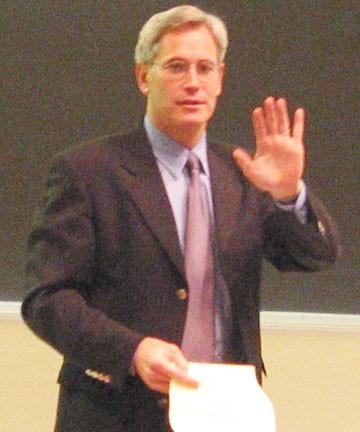
Separating truth from mythology
Richard Shenkman didn’t promise the truth at last night’s Gartner Honors Lecture, but he promised the truth according to him. His lecture, “Myth America,” discussed the validity of American myth and the place it holds in society.
The University Honors Program invited Shenkman to be a part of the Gartner Lecture series after April Andreas, UHP coordinator, suggested him. Andreas was a fan of Shenkman’s 1997 prime time series “Myth America” on The Learning Channel and read his book Legends, Lies & Cherished Myths of American History when she was just 10 years old.
According to Shenkman, American mythology began in the early 19th century as an American nationalistic campaign. It continues to flourish thanks to tourist demand for American lore and the inability of many Americans to let go of the myths that have so shaped North American culture.
“American intellectuals and writers are responsible for a lot of the myths,” Shenkman said.
One such myth is the legend of Philadelphia’s Liberty Bell. A children’s writer wrote that a young boy ran to tell the old man in the bell tower the Declaration of Independence was signed. The overjoyed man rang the bell and all of Philadelphia celebrated.
Another myth of patriotic proportions surrounds Betsy Ross and the sewing of the first American flag. According to Shenkman, following a tour of Ross’s home, he asked the tour guide if the story she had told concerning the flag was true, and she admitted it was not. But the legend continues to be passed down because of the cultural significance of the story.
Shenkman says some Americans choose not to learn the truth, particularly when it comes to presidents. Shenkman even quotes Ronald Reagan as saying, “I don’t understand how anyone can be president without being an actor first.” Presidents are susceptible to myth because they are selling themselves when they run for office.
“Presidents are actors,” Shenkman said.
The president most shrouded in myth is President Kennedy. When he asked fellow tourists at the John F. Kennedy Museum in Boston if they were at all intrigued by Kennedy’s adulterous affairs blatantly left out of the museum, all said no. Another Kennedy myth is that of JFK as a young and vibrant president. Kennedy, diagnosed with Addison’s disease, was actually one of the most ill presidents in United States history. The adrenal gland disorder required Kennedy to inject himself with a number of drugs every day, and his bushy hair and rosy cheeks were just side effects of the cortisone injections.
Even Abraham Lincoln has been elevated to a mythical status. According to Shenkman, Lincoln was not an abolitionist despite signing the Emancipation Proclamation. He believed in allowing states with slavery to keep their practice, but he did not support the spread of slavery to the territories.
The Vietnam War is also shrouded in mystery, said Shenkman. Little know it, but Lyndon B. Johnson lied to Congress to convince them to sign the Gulf of Tonkin Resolution and start war with Vietnam. But Shenkman argues the bigger myth that led to Vietnam was the belief that the United States would never lose a war.
Myths are not necessarily bad according to Shenkman. He believes myths tell Americans who they are and what to value. When people begin to question what they are told, they end up doubting everything. Instead, Shenkman suggests people seek out the truth for themselves in libraries, museum and reliable news sources like The New York Times and The Washington Post. But not everyone is a Shenkman fan.
“[Shenkman is] very much loved by some historians and very much hated by some historians,” said Dennis Cordell, associate dean of general education.
Shenkman, an associate professor at George Mason University, is also the editor and founder of http://www.HistoryNewsNetwork.org., a Web site with articles by historians about current events. For students who missed the lecture, the University Honors Program and the SMU Bookstore are hosting a Meet the Author and Book Signing Event today from 10:30 to 11:30 a.m.








